Africa-Press – Rwanda. The continent’s education systems require urgent reforms, the United Nations Under-Secretary-General and Executive Secretary of the Economic Commission for Africa (ECA), Amb Claver Gatete, emphasized during the pre-launch of the African Union Theme for 2024 in Addis Ababa, Ethiopia, on February 16.
Gatete who earlier made a case for a digital transformation of education systems so as to generate a workforce for the future emphasised the pressing need for reforms in Africa’s education systems to achieve the vision of “The Africa We Want.” The unveiled theme is “Educate an African fit for the 21st Century: Building resilient education systems for increased access to inclusive, lifelong, quality, and relevant learning in Africa.”
“When individuals are equipped with the right knowledge and skills, they are empowered to make informed decisions. They can lead healthy lives. They can build resilience when faced with development challenges,” he said
“However, we know that our education systems require urgent reforms if we are to get to the Africa We Want. Only education unusual will deliver the SDGs and Agenda 2063 for Africa.”
Gatete stressed that the call to move from commitment to action reflects the urgency of the task ahead, adding that high quality education and lifelong learning are the catalysts to achieve SDGs and Agenda 2063.
He further noted that in the 21st century, it is unacceptable for one in five school-aged children to not attend school.
The skillset of the future global workforce is increasingly centred around technology, with digitalisation playing a pivotal role. Recent global events, such as the Covid-19 pandemic, have underscored the importance of proficiency in data analytics, behavioural science, and foresight analysis.
Gatete said they help governments develop better policies and capabilities to respond to unknowns and build resilience.
“The actions we take today will determine if Africa gains or loses,” he continued. “We need education programmes that improve affordability, access, quality institutional credibility, and delivers employable skills and entrepreneurship attributes.”
Gatete emphasised that education should empower countries to expedite the realisation of the SDGs and Agenda 2063.
“We, therefore, cannot overemphasise the importance of science, technology and innovation, and initiatives that promote technical and vocational education and training. Indeed, the benefits that Africa can realise by getting our education system right are undeniable,” he said.
However, he noted that this cannot be done if only 2 per cent of African universities are ranked in the top 500 globally in STEM fields.
“We will not succeed if women remain under-represented, at less than 30 per cent in high tech domains such as artificial intelligence,” he added.
‘Rally stakeholders and fight structural barriers’
Gatete said that Africa must rally all stakeholders to unleash its transformation through innovation. However, he recognized that there is a need to first address the structural barriers that continue to impact educational outcomes, especially barriers of inclusivity, affordability, accessibility, and applicability.
“Our education systems must also be context specific and leverage the natural comparative advantages of countries,” he continued. “For example, there is no reason why Chad’s livestock sector cannot be a global competitor on leather goods. It is not inconceivable to think that Ghanaian and Ivorian chocolate cannot, one day, compete with their Swiss equivalent.”
Gatete noted that the blue economy in Comoros can drive the new frontier for African Renaissance, as called for in Agenda 2063, asserting that all can be achieved if the education systems are aligned with market and societal needs.
Intentional and nurtured partnerships between governments, industries and academic institutions can support knowledge and technology transfer that serve the needs of industrial sectors, said Gatete.
“It is true that we are faced with very constraining fiscal space, but the opportunity cost of inaction is a far more expensive price to pay,” he explained. “Securing the necessary resources to reform our education system should not be an either-or situation. In this regard, private sector also has critical role to play.”
Gatete emphasised the need to transition from commitment to action, assuring everyone of ECA’s ongoing support as they kick off the theme for the year 2024.
For More News And Analysis About Rwanda Follow Africa-Press






